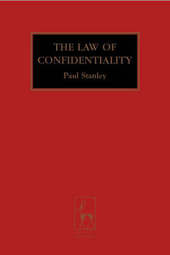
|
The Law of Confidentiality: A Restatement
Paperback / softback
Main Details
| Title |
The Law of Confidentiality: A Restatement
|
| Authors and Contributors |
By (author) Paul Stanley KC
|
| Physical Properties |
| Format:Paperback / softback | | Pages:198 | | Dimensions(mm): Height 234,Width 156 |
|
| ISBN/Barcode |
9781841138114
|
| Classifications | Dewey:342.420858 |
|---|
| Audience | | Professional & Vocational | |
|---|
|
Publishing Details |
| Publisher |
Bloomsbury Publishing PLC
|
| Imprint |
Hart Publishing
|
| Publication Date |
25 April 2008 |
| Publication Country |
United Kingdom
|
Description
The last twenty years have seen rapid development of the equitable action for breach of confidence. The Spycatcher saga of the late 1980s led to the restatement of the fundamental principles. There was increasing concern about press intrusion, and the need to protect privacy rights guaranteed by Article 8 of the European Convention in the wake of the Human Rights Act 1998. Against that background, a number of high-profile cases-such as Campbell v MGN Ltd (2004)-explored how common law principles laid down in the nineteenth century might be adapted to twenty-first century conditions. How far will the law go in protecting privacy? Meanwhile, in the "information age", the law has had to grapple-for instance in Douglas v Hello! Ltd (2007)-with how best to protect the commercially valuable information and when it should assist those who wish to exploit it. The result has been rapid development of the law in many diverse areas. The Law of Confidentiality: A Restatement goes behind the mass of cases to tease out the fundamental principles underlying the modern law. It examines the central questions of substance: the circumstances in which information is protected by law, and how it responds to conflicting public interests. It also looks at the important practical questions of procedure and remedies. It aims to be useful to those looking for a guide to the main principles and controversies in the field, and also to the practising lawyer looking for a clear statement of the basic principles.
Author Biography
Paul Stanley is a barrister in London. He was educated at Cambridge University and Harvard Law School. He represented OK! Magazine in the House of Lords in Douglas v Hello! Ltd (2007), and was junior counsel for the respondent in the Privy Council appeal in Associated Electric and Gas Service v European Reinsurance Co of Zurich (2003).
Reviews...this is an extremely engaging account of the law of confidentiality...it will be a useful resource to practitioners seeking to find their way through the labyrinth of authorities and to identify clear and workable principles on which to proceed...It is highly recommended, and a final word of congratulation must also go to the publishers, Hart Publishing, on the fine production qualities of the volume they have produced. -- Sam Ricketson * European Intellectual Property Review, Vol 31, Issue 11 * ...provides a refreshing analysis into the development of this law...a nifty guide, easy to handle, 162 pages excluding the index...This book is not only reader-friendly, but a welcome addition by emphasising the relevant cases, principles and controversies for noting and discussing by the busy academic or practitioner...an invaluable guide in understanding the complexities of this important emerging area of law. -- Rebecca Wong * Web Journal of Current Legal Issues * Paul Stanley has marshalled the main body of primarily English case law on confidential information into an extremely clear well-written, engaging, and succinct exposition...Stanley's book is certainly a valuable contribution to the field. It is extremely helpful in the setting out of the contours of the law confidence, alerting the reader to the more controversial issues, and providing a conceptual framework through which to view a complex area of the law. It achieves what it sets out to do and would recommend it to practitioners and academics alike. -- Tanya Aplin * intellectual Property Law and Practice * Each proposition is accompanied by a succinct discussion of the law relating to it, which is well-footnoted and includes both cases and relevant academic article literature...The author highlights areas of contention and differences of opinion and is quite prepared to challenge the validity of certain precedents or other authors' opinions...I found this an informative and readable work which, in my view, achieves its objective of 'restating' this flexible and expanding equitable action. -- Howard Johnson * Communications Law, Vol 14, No 2 * Paul Stanley's book convincingly demonstrates that the age of restatement has not passed, and that there is a place in the literature on confidential information for a propositional text. The book is an important addition to the literature on confidential information. It is strongly recommended to all lawyers who grapple with this fascinating area of legal inquiry. -- Michael Bryan * Media and Arts Law Review, Volume 15 *
|